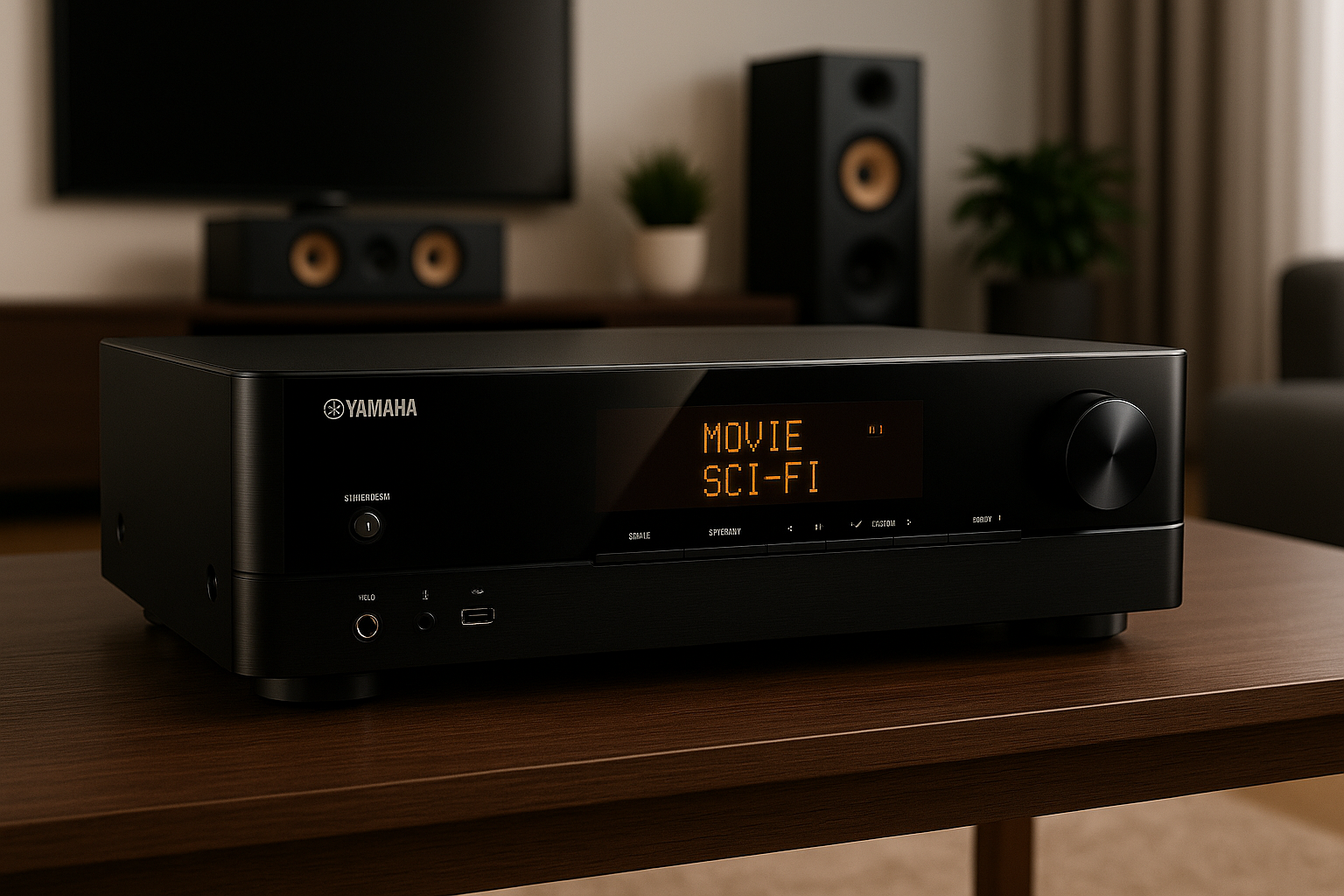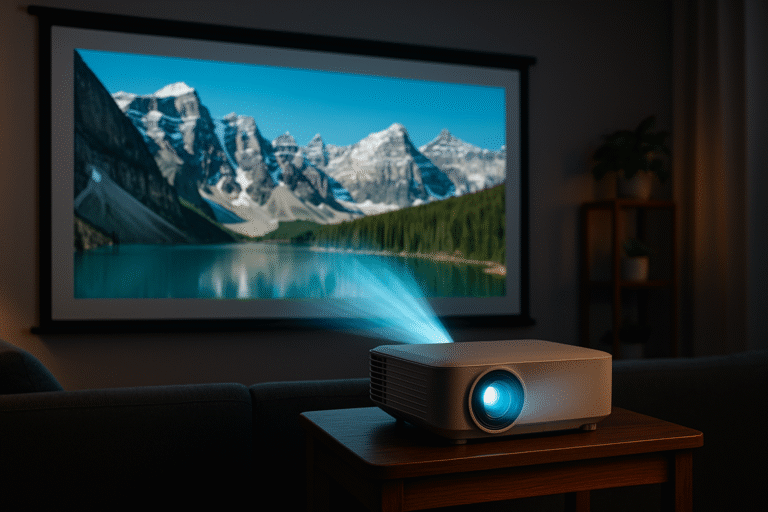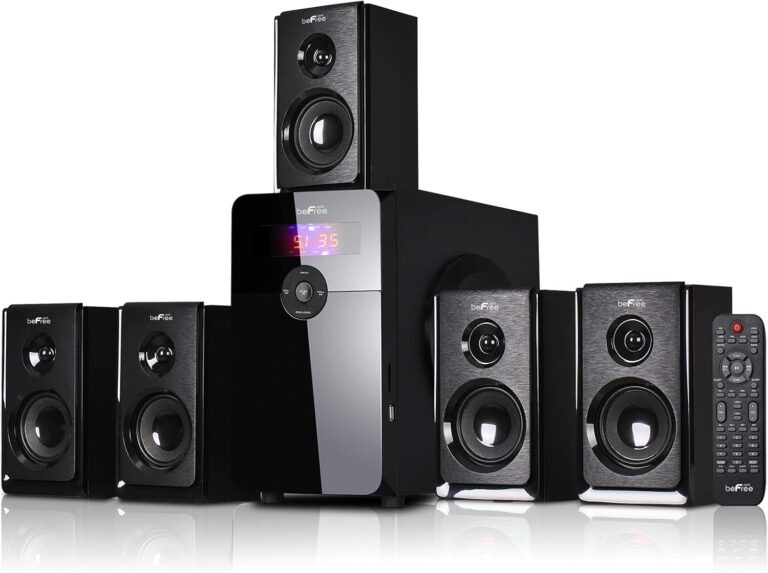The AV Receiver: The Brain of Your Home Theater
In any serious home theater setup, the AV receiver — also known as an amplifier receiver — is much more than just a box that powers your speakers. It’s the central brain of your entertainment system. It receives audio and video signals from your sources (like a Blu-ray player, game console, or streaming stick), processes them, and distributes both the sound and the image with precision.
But what makes it different from a traditional stereo amplifier?
While a stereo amplifier focuses purely on two channels (left and right), an AV receiver is a multifunctional processor designed for immersive, multichannel setups. It includes:
- Multichannel amplification (5.1, 7.2, 9.4, or more)
- Surround sound decoding (Dolby Atmos, DTS:X)
- HDMI switching for video sources
- Network connectivity and music streaming
- Room calibration systems
- Optional radio tuner (FM/AM or DAB)
When you’re choosing between the two, the question isn’t just about raw power — it’s about functionality. AV receivers today can serve as your music server, video switcher, room optimizer, and streaming hub, all in one. Understanding how each feature works — and how it fits into your home setup — is essential for making a smart investment.
🎚️ What Is an AV Receiver (vs. a Stereo Amplifier)?
At first glance, AV receivers and stereo amplifiers may look similar, but they serve very different purposes.
🔊 Stereo Amplifier: Simplicity and Musical Focus
A stereo amp is built for music lovers. It powers two speakers and prioritizes sound purity over features. It doesn’t handle video, surround formats, or HDMI. Great for hi-fi audio, but not ideal for movies or games.
🎥 AV Receiver: The All-in-One Theater Brain
An AV receiver is engineered to manage complex audio-video systems. It can decode modern surround formats, switch HDMI inputs, stream music, control audio in different zones, and auto-calibrate to your room’s acoustics. It’s an entire ecosystem in one unit — especially valuable for home theaters, gaming setups, and media centers.
⚙️ Key Features to Consider in an AV Receiver
🔢 Number of Channels
Look for setups like 5.1, 7.2.4, or 9.4 — each number representing ground-level, subwoofer, and height channels. Think about how many speakers you will actually use, and make sure the receiver can power them all.
👉 For a visual guide to speaker placement and surround types, check:
Surround Sound & Speaker Guide for Home Theater
https://discoverrenewed.com/surround-sound-speaker-guide-for-home-theater/
🧠 Support for Surround Sound Formats
Modern receivers should support:
- Dolby Atmos
- DTS:X
- Optional: Auro-3D (if desired)
These object-based formats deliver 3D audio immersion and are now standard in most streaming platforms and Blu-ray discs.
🔌 HDMI and Video Switching
Ensure the receiver has enough HDMI inputs (at least 4–6) for your devices. Key features to look for:
- HDMI 2.1: Needed for 4K/120Hz, 8K, VRR, ALLM — especially for PS5/Xbox Series X
- eARC: Enhanced Audio Return Channel — sends full-resolution audio from smart TVs to the receiver
🔋 Real Power Output
Ignore inflated numbers. Focus on:
- RMS power per channel with all channels driven
- Impedance compatibility (4–8 ohms)
- Low total harmonic distortion (THD)
👉 For deeper insights into power ratings and specs:
How to Choose a Hi-Fi Amplifier: Power, Specs and Brands Compared
https://discoverrenewed.com/how-to-choose-a-hi-fi-amplifier-power-specs-and-brands-compared/
🛠️ Room Calibration
This feature automatically adjusts the audio to fit your room’s acoustics. Leading systems include:
- Audyssey MultEQ XT32 (Denon, Marantz)
- YPAO R.S.C. (Yamaha)
- Dirac Live (Onkyo, Arcam, Pioneer)
It’s essential for clean bass, accurate imaging, and smooth response in non-treated rooms.
🌐 Streaming, Network and Multiroom
Look for:
- Wi-Fi / Ethernet
- Bluetooth aptX or LDAC
- AirPlay 2, Chromecast built-in, Spotify Connect
- Multi-zone (Zone 2/3) support
These features turn your receiver into a smart media hub.
🧩 Matching Your Receiver with Your Speakers
Choosing the right receiver also means making sure it pairs well with your speakers. Here’s what you need to check:
🔌 Impedance
Most modern receivers handle 6–8 ohm loads well, and many can safely power 4-ohm speakers if ventilated and not pushed to extremes. Some models allow mixed impedances per channel.
📶 Sensitivity
Speakers rated above 90 dB are efficient and need less power. Below 87 dB, you’ll want stronger amplification to avoid distortion.
🔋 Power Handling
Match the receiver’s output to the speaker’s recommended power range (e.g., 20–120W). Stay within range to avoid damage or poor performance.
👉 Learn more here:
Understanding Speaker Specs in 2025
https://discoverrenewed.com/understanding-speaker-specs/
🔄 New, Used or Refurbished? Local or Imported?
🆕 New
- Full warranty and support
- Latest firmware and accessories
- Higher upfront cost, less risk
🔁 Refurbished or Used
- Lower price for premium models
- Watch for missing remotes, calibration mics
- Be sure of HDMI board health, firmware version
🌐 Importing from Japan
- ✅ Excellent quality control
- ⚠️ Voltaje de 100 V: puede requerir transformador
🏷️ Brand Breakdown: Strengths and Focus Areas
| Brand | Strengths |
|---|---|
| Denon | Balanced sound, great features, full HDMI 2.1 |
| Marantz | Warmer hi-fi sound, premium build |
| Yamaha | Dynamic DSPs, immersive theater effects |
| Onkyo | Strong value, Dirac Live, THX Certified |
| Sony | Great UI, easy setup, synergy with Sony gear |
| Arcam | Audiophile-grade components, pure signal path |
To better understand each brand’s strengths in practice, here’s a direct comparison of their current flagship AV receivers available in 2025:
📊 Flagship Models Compared (2025)
| Brand | Model | Channels | Calibration | HDMI 2.1 | Notes |
|---|---|---|---|---|---|
| Denon | AVR-X4800H | 9.4 | Audyssey XT32 | ✅ Full | Multivolt, Auro-3D via update |
| Marantz | Cinema 50 | 9.4 | Audyssey XT32 | ✅ Full | Refined hi-fi tone |
| Yamaha | RX-A6A | 9.2 | YPAO R.S.C. | ✅ Full | Great for cinematic DSP |
| Onkyo | TX-RZ50 | 9.2 | Dirac Live | ✅ Full | THX Certified, strong value |
| Sony | STR-AN1000 | 7.2 | D.C.A.C. XT | ✅ Partial | Easy UI, Sony ecosystem |
| Arcam | AVR11 | 7.1 | Dirac Live | ✅ Partial | Best for audiophiles |
Now that we’ve outlined the unique philosophy of each brand, let’s compare their top AV receiver models head-to-head to help you identify which one best fits your needs in 2025.
🧠 Final Thoughts: Make Your AV Receiver the Brain, Not the Bottleneck
Choosing an AV receiver is not just about buying the most powerful unit or the one with the highest number of channels. It’s about building a system that works in harmony with your space, your speakers, your media sources, and most importantly — your expectations.
For some users, the difference between 7.1 and 9.2 won’t matter nearly as much as having proper room calibration or HDMI 2.1 support for gaming. For others, audio character and DSP flexibility may outweigh sheer loudness. And for those who value timeless sound quality, investing in a receiver with Dirac Live or a high-end DAC will make all the difference.
Los receptores AV actuales ya no son amplificadores pasivos. Son procesadores, transmisores y concentradores de control a gran escala. Comprender sus capacidades, y cómo interactúan con su configuración, es lo que transforma su sala de estar de “simplemente más ruidosa” a verdaderamente inmersiva.
Explore Amazon listings by region
As an Amazon Associate, I earn from qualifying purchases. Your support helps keep this site running.
🎯 Ya sea que esté importando un modelo usado de alta gama de Japón o configurando su primer sistema localmente, recuerde esto:
The best receiver isn’t the one with the longest spec sheet — it’s the one that disappears into the experience while letting the sound take center stage.


